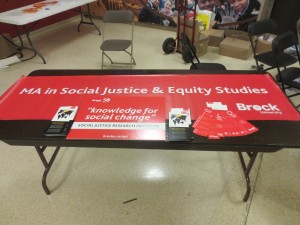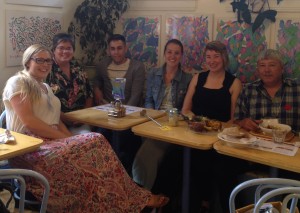SJRI Originals: A Public Forum for Transdisciplinary Social Justice
Rachel Hirsch, SJRI Projects Facilitator, Brock University
Mary-Beth Raddon, SJES Graduate Program Director, Associate Professor, Sociology, Brock University
 A new opportunity exists to produce and share original social justice content: “SJRI Originals” is a selection of short online articles. SJRI members and friends are welcome to share their engagements with transdisciplinary (TD) social justice scholarship by writing about their experiences, understandings, and future plans.
A new opportunity exists to produce and share original social justice content: “SJRI Originals” is a selection of short online articles. SJRI members and friends are welcome to share their engagements with transdisciplinary (TD) social justice scholarship by writing about their experiences, understandings, and future plans.
This blog article introduces the intent behind the “SJRI Originals” series including some thoughts about what “transdisciplinary social justice” is and how it can (if it can) be mobilized as a social intervention.
Transdisciplinary research practices are issue- or problem- centered and prioritize the problem at the center of research over discipline-specific concerns, theories or methods (Leavy, 2011, p. 9).
Transdisciplinarity is a mode of inquiry that aims to produce knowledge centered on a thematic and/or problematic. This approach recognizes the need to invite multiple perspectives into dialogue to better understand questions without easy answers. An exploratory ‘space’ for inquiry is then held within individuals or collectively in groups of researchers by sharing knowledge from and beyond multiple disciplines about these issues. The flow of knowledge is iterative and cyclical resulting in the emergence of new knowledge(s), frameworks, or problems.
Many problematics require transdisciplinary approaches that concern the meaning of and means to achieving social justice. Moreover, transdisciplinarity can operate as a social justice practice when it disrupts systems of dominance by revealing and questioning knowledge hierarchies (Leavy, 2012; Mitchell, 2011). This may occur through the valuing of marginalized perspectives or by recognizing the politics inherent in different knowledge systems.
In August 2014, Brock’s MA in Social Justice and Equity Studies (SJES) and SJRI partnered to bring a delegation of Transdisciplinary Social Justice Witnesses to the Peoples’ Social Forum (PSF). The PSF is a critical public space aimed at fostering activism in individuals and civil society organizations interested in transforming their communities and organizations across Canada. It is where social movements converged to express alternative ideas about how to address pressing social concerns.
The PSF offers a glimpse into how TD can be mobilized as a social justice  practice by bringing people from different social positions together to discuss common interests and consider how to enact change. Blaire Hinsperger-Fox and Sherri Vansickle share highlights from the PSF including hearing about how to build a climate justice movement, participating in a workshop on harm reduction for injection drug use, learning about cultural appropriation of Native images, and sharing stories about missing and murdered Native women in Canada.
practice by bringing people from different social positions together to discuss common interests and consider how to enact change. Blaire Hinsperger-Fox and Sherri Vansickle share highlights from the PSF including hearing about how to build a climate justice movement, participating in a workshop on harm reduction for injection drug use, learning about cultural appropriation of Native images, and sharing stories about missing and murdered Native women in Canada.
For some, the TD potential of the PSF is in its ability to reveal deep-rooted contradictions in how certain knowledge(s) are produced, mobilized, or even paralyzed. Vanessa Morgan Sloan tackles a criticism of the PSF – its “whiteness”. The illusion of inclusivity present at the PSF, Vanessa explains, is symptomatic of the larger paradox of multiculturalism in Canada as a largely “white” country. In anticipation of white dominance, non-white spaces were created at the PSF, attempts were made to inform and interrogate issues of privilege, and witnesses such as Vanessa were able to walk away feeling blessedly unsettled and with a greater sense of responsibility.
Transdisciplinary social justice is realized where spaces for dissent, imagination, and solidarity are created beyond the formal institutional bounds of academia, government, nonprofit, and other organizational structures. In these spaces, encouraging authentic encounters through such acts as food sharing, consensus decision-making, artistic expression and public protest enables an alternative mode of life.
SJRI members and friends who would also like to share their experiences, understandings, or pursuits of transdisciplinary social justice are welcome to join this conversation.
To be considered for the “SJRI Originals” blog series please submit an article (500-1500 words) to Rachel Hirsch indicating alignment with one of three possible themes:
- Experiencing Social Justice – for those that have encountered transdisciplinary social justice in action.
- Understanding Social Justice – for those who have conducted transdisciplinary social justice research.
- Pursuing Social Justice – for those who are looking to collaborate on a proposed transdisciplinary social justice project.
The Social Justice Research Institute (SJRI) was established to advance transdisciplinary social justice scholarship, innovative knowledge mobilization strategies, and community-university partnerships. The SJRI Projects Facilitator, Rachel Hirsch, works with affiliated faculty at Brock University and other members to build capacity for research in the area of TD social justice.
The Social Justice and Equity Studies (SJES) program is an established interdisciplinary MA program. The SJES Director, Mary-Beth Raddon, oversees the training of graduate students in advanced social justice research and facilitates opportunities for them to practice transdisciplinarity.
References
Leavy, P. (2011). Essentials of trandisciplinary research: Using problem-centered methodologies. Walnut Creek, CA: Left Coast Press, Inc.
Leavy, P. (2011). Transdisciplinarity and training the next generation of researchers: Problem-centered approaches to research and problem-based learning. International Review of Qualitative Research, 5(2), 205-223.
Mitchell, R. (2011). Sustaining change on a Canadian campus: Preparing Brock University for a sustainability audit. International Journal of Sustainability in Higher Education, 12(1), 7-21.



